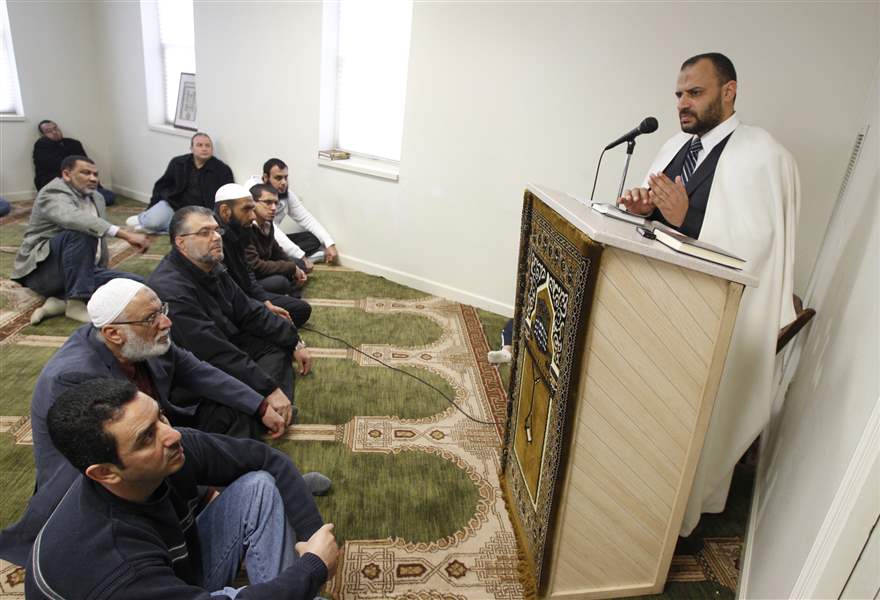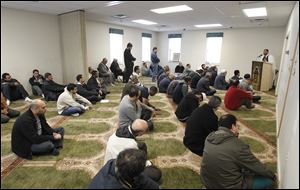
Toledo mosque hires imam from Egypt
Spiritual leader served in Toledo in 2006, 2007
3/28/2011
Imam Ahmed Abou Seif leads a prayer service at the Toledo Muslim Community Center on West Sylvania Avenue in a building that formerly housed the J. Jeffrey Fretti mortuary.
The Blade/Dave Zapotosky
Buy This Image

Imam Ahmed Abou Seif leads a prayer service at the Toledo Muslim Community Center on West Sylvania Avenue in a building that formerly housed the J. Jeffrey Fretti mortuary.
The mosque, which has been drawing more than 120 people to its Friday Juma prayers, Muslims' largest weekly service, bought the defunct funeral home at foreclosure last September and is finishing remodeling of the 5,700-square-foot facility.
The center's board recently hired an imam, or spiritual leader, from Egypt who previously served at Masjid Saad, another Toledo mosque.
Imam Ahmed Abou Seif, 37, left Toledo in 2007 to complete his doctoral dissertation in theology at Al-Azhar University in Cairo.
For a new mosque, hiring an imam "is a big step," acknowledged Abdel-Hamid Hasabelnaby, a member of the center's board of trustees. But it became necessary because of the rapid growth. "There was a need for a good imam to come. If you get a good one, he will educate the people in Islam in a practical way."
Imam Abou Seif was in Cairo during the recent Egyptian uprising, arriving in Toledo late last month.
Witnessing the peaceful revolution that forced the resignation of longtime ruler Hosni Mubarak "was a great experience because it represented how all Egyptians, Christians, and Muslims came together united to protest the regime," Imam Abou Seif said in an interview, speaking Arabic with interpretation by center board member Mohammed Elnahal. "It was unique in the respect that all Egyptians came together regardless of their faith, regardless of their religion, to protest the regime."
He said Egyptian Christians provided protection to Muslims from Mubarak-backed police during Friday prayers, and Muslims provided security for Christians during Sunday services.
Imam Abou Seif said he felt his role during the Egyptian tumult was "to guide the people and tell them you can still achieve your demands without violence, in a way that is completely peaceful."
He is optimistic about Egypt's future, he said, because "it's God's will to protect Egypt because Egypt is mentioned in the Qur'an," or Islamic Holy Book, and "on a personal level because the situation in Egypt has been improving."

Worshippers gather at the Toledo Muslim Community Center on West Sylvania Avenue for Friday Juma prayers.
The imam, who has just started taking English language classes, said Islam places a strong emphasis on education, and he attributed much of the world's violence -- including terrorism -- to a lack of knowledge and understanding.
"We have to make a difference between those people who have a deep knowledge of religion and who understand religion, and those people who have only a simple or superficial knowledge of religion," he said.
People who contend the Qur'an permits the killing of innocent people are misquoting Scriptures, Imam Abou Seif said. "They pull verses out of their historical context and apply these verses to different contexts. And so these people oppress themselves first before they oppress others."
Muslims who truly understand Islam would never commit terrorist acts, he asserted, adding that he will be quick to denounce, from the pulpit, any terrorist acts.
Imam Abou Seif said most Americans who protested planned mosques in such places as New York, Tennessee, and California are religiously ignorant.
"These people who protested the building of mosques, do they represent Christianity with its tolerance of others? No, of course not," Imam Abou Seif said. "Will the Christian scholars speak against the building of mosques and Islamic centers in the United States? Of course not. Who speaks against that? It's only the very few who are not educated on Christianity and the true Christian principles that call for tolerance and acceptance and respect for other religions."
The imam said that when he was in Toledo in 2006 and 2007 he supported interfaith cooperation, citing as an example his involvement with a multifaith project for Habitat for Humanity.
When he was in Cairo, he said, he made several trips to India with a delegation of Egyptian Coptic Christian priests, and last week he and members of the center's board of directors made an introductory visit to St. George Coptic Orthodox Church in Monclova Township.
Among his goals as Toledo's newest imam is "to put the TMCC on the map of Ohio," he said.
The biggest challenge he sees at this point is the center's financial limitation.
"The budget is small, the mosque is small, but it is growing. That can be the only challenge because Muslims are the same and the message is the same," he said.
The mosque's sign on busy Sylvania Avenue bears the cryptic designation of "TMCC Community Center," but Mr. Hasabelnaby said its crescent-and-star symbols clearly identify it as an Islamic center.
The mosque was founded in April, 2009, by local Muslims who wanted a center closer to their homes. The new site is roughly midway between the Toledo area's two largest mosques, each with membership of 500 families: the Islamic Center of Greater Toledo in Perrysburg Township, and Masjid Saad on Alexis Road in Sylvania.
Mr. Elnahal said it was "a matter of convenience" to start a mosque and that there were no ideological or doctrinal differences behind the move. Mr. Hasabelnaby said the center and its members have good relationships with all local mosques and Muslims.
The new imam said that in his free time he enjoys reading "in all fields, not just religion," and used to be active in karate. He and his wife have three children.
Contact David Yonke at: dyonke@theblade.com or 419-724-6154.